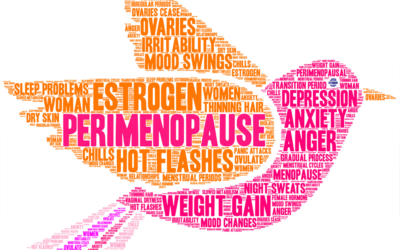

Are You Navigating the Symptoms of Perimenopause?

When I was in my mid-forties I started experiencing a number of seemingly unrelated symptoms – weight gain, brain fog, sore joints, and fatigue. I tried all sorts of one-off fixes – diets, exercise programs, and magic pills – without success. It wasn’t until my period started changing and I experienced hot flashes that the penny dropped and I connected everything to perimenopause. Did it happen like that for you too?
I wonder why there isn’t more talk about perimenopause? After all, it happens to all ladies, although it’s true that some have more challenges with it than others.
Perimenopause (and menopause) is the bookend to puberty, the reproductive part of our lives. So it includes a lot of hormone changes as the reproductive hormones – primarily estrogen and progesterone – naturally decline.
But the real challenge comes with how those changes impact our wellbeing. Like mood swings, inability to sleep, extreme fatigue, joint pain, digestive issues, hot flashes, night sweats, low sex drive and weight gain. What’s up with all that? Why can’t we just wind up our periods and call it a day?
There are two paths for getting help with perimenopause. The medical path and the lifestyle path. Unfortunately, many doctors are not well equipped to help. The American Association of Retired Persons reports most medical schools and residency programs don’t teach physicians in training about menopause. To make matters worse, a recent survey found that just 20% of ob-gyn residency programs provide any kind of menopause training.
When asked, 3 out of 4 ladies reported they did not get adequate treatment when they brought perimenopausal and menopausal concerns to their doctors. And 84% of women say their symptoms interfere with their lives and some are even debilitating.
One of the main areas where doctors should be able to help is in prescribing Hormone Replacement Therapy (HRT). Even though treatment has changed dramatically over the past decade, many doctors are unaware. The new body identical treatment is administered in patches or gel and poses none of the earlier health concerns for breast cancer and heart disease. The topical delivery method means that the liver is completely bypassed, and that absorption through the skin dramatically changes the health risks. Dr. Louise Newson, The Menopause Doctor, goes so far as to encourage women to consider taking body identical HRT for the protections it provides against heart disease, osteoporosis, diabetes and Alzheimer’s.
The other path to get help with the symptoms of perimenopause is through lifestyle. There is a lot that lifestyle habits and behaviors can do to demystify the changes. It turns out the healthy practices of diet and exercise that ladies maintained before perimenopause are unlikely to suit them very well once they enter perimenopause. As our nutrition needs change, so does our digestion. We no longer need all the protein we used to eat, and our sensitivity to sugar and processed foods heightens. Bloating, brain fog, joint pain and weight gain result.
And with hormonal changes to our muscles and joints, the type of exercise and movement that is beneficial also changes. Even if you have always been athletically active, the fatigue and joint pain can make ambitious workouts very difficult. In fact, high impact and anaerobic exercise can cause stress to the system and result in the production of cortisol, the stress hormone. The timing and type of movement you choose take on new importance.
Hormonal changes impact sleep, especially when combined with food choices and stress. So figuring out new sleep hygiene habits are vital to being able to restore the body each night with quality sleep. As we sleep, the body is busy removing dead cells burning fat and rebuilding tissue. The brain catalogues the day’s experiences and builds up memories. Without adequate sleep, the body is stressed when it cannot carry out these maintenance functions and produces cortisol in response. That in turn stimulates appetite, which produces more insulin leading to fat production (and stubbornly stored around the middle). So getting enough good sleep is vital to being able to adapt through the changes of perimenopause.
And finally, mindfulness – getting your head in the game is so important. As it happens, the mind can only focus on one thing at a time. So if you control some of the things you tell yourself and make them positive things, you will benefit from that. Rather than tell yourself that you’re a lazy slob or beat yourself up because you don’t have enough willpower, you tell yourself that you’re an intelligent woman and the goal is achievable. Meditation is a great way to calm the mind, focus on positive things and create endorphins. This can really help to create positivity, reduce cortisol levels and help with sleep.
Are you satisfied with the support your doctor has been giving you for the symptoms of perimenopause? Some symptoms are best resolved using HRT. But many more can be resolved by taking a lifestyle approach.
The beginning of my perimenopausal journey didn’t go well, and I’m determined to help ladies navigate this chapter of their lives so they can take control of the next decades and live their best lives.
To find out how you can navigate the symptoms of perimenopause, click the button to book your free call with Dyna Vink, Health and Nutritional Coach.
The Veil of Secrecy Over Perimenopause

If you’re anything like me, perimenopause or menopause was never really a conversation that I had – with friends, at work, or in school. My mother was willing to discuss it, but she claimed not to have had much in the way of issues. Now I look back at osteoporosis, heart challenges, weight gain, mood disorders and dementia with a different perspective. I think her understanding of the process was limited – like mine was.
Why is it that we aren’t having these conversations? There is lots of talk about reaching puberty, contraception, about having children and caring for elders. Until the last 5 years, it seems that these conversations about perimenopause just weren’t happening. And now they begin.
Different studies peg the percentage of women who felt unprepared for perimenopause or menopause between 63% and 87%. This is a very high number considering this is a natural life process that all women go through. Don’t you think we should have a better understanding of this anticipated stage of life?
One major factor that is responsible for these numbers is that doctors seem poorly equipped to support women by offering lifestyle or even pharmaceutical options to address the symptoms, and ultimately the quality of life. In fact, women’s health research has been scant over the years because researchers found women to the “unreliable study subjects” due to their hormonal fluctuations. So instead of delving into that mystery, most health research omitted women altogether.
The AARP did a study on this perplexing issue and reported that 75% of women felt dismissed or poorly supported by their doctors for issues around perimenopause or menopause. In trying to make sense of this, the researchers went to doctors (residents, GPs and gynecologists) to ask if they felt comfortable dealing with hormone related cases. 80% reported that they did NOT feel comfortable or well equipped to attend to these cases. The reason is because hormone related studies are considered an elective and generally aimed at students pursuing endocrine-related specialties.
Another probable reason we don’t talk about it is because of the widely held perception of a woman being a shriveled-up shell once she is past child-bearing years. Women don’t want to expose themselves to that negative labeling and the result is that the topic is not discussed. This is a societal norm based on misogyny and ageism. Neither of them serves us well.
In the workplace, women are already dealing with discriminating factors, so they don’t want to reveal a further weakness once they hit perimenopause.
Most women receive support through difficult menstrual cycles and with childbearing. So the question is, why aren’t they equally supported and better prepared for perimenopause and menopause during the tumultuous time as hormones decline in the third chapter of life. As we live much longer than our forebears of hundreds of years ago, this chapter is a lot longer than it used to be. Consider the previous life expectancy of 50 years in 1700 compared with 82 years in 2022.
The issues are real and women don’t need to struggle in isolation. We have the knowledge to anticipate and mitigate so many of the symptoms and indeed prevent many age related underlying conditions. Let’s share this knowledge with the sisterhood.
If you have questions, you are invited to book a free call so we can discuss your situation.

Holistic Nutrition Lifestyle | Copyright © 2025 | All Rights Reserved
“This site is not a part of the Facebook website or Facebook Inc. Additionally, this site is NOT
endorsed by Facebook in any way.
FACEBOOK is a trademark of FACEBOOK, Inc.”